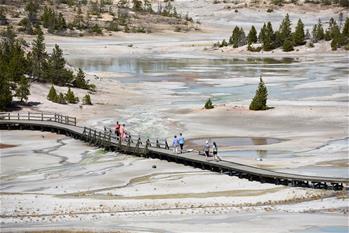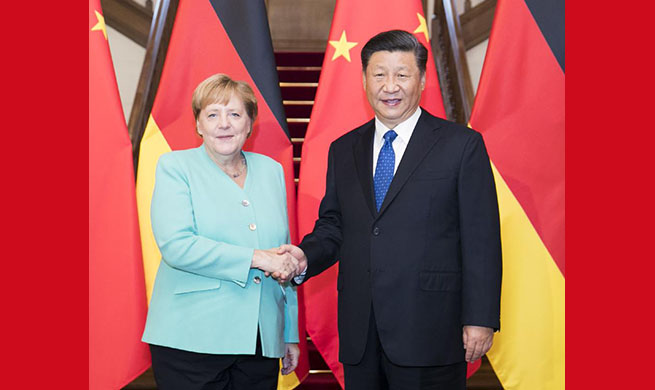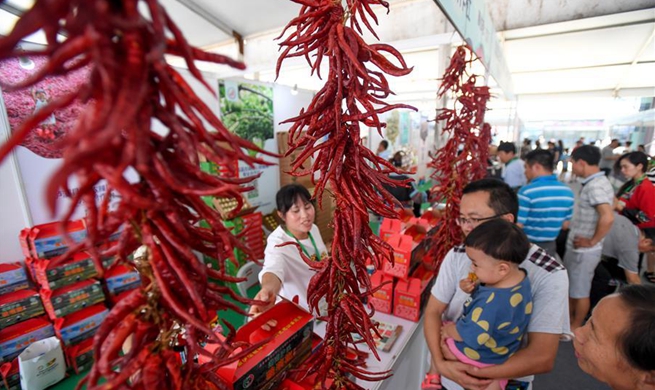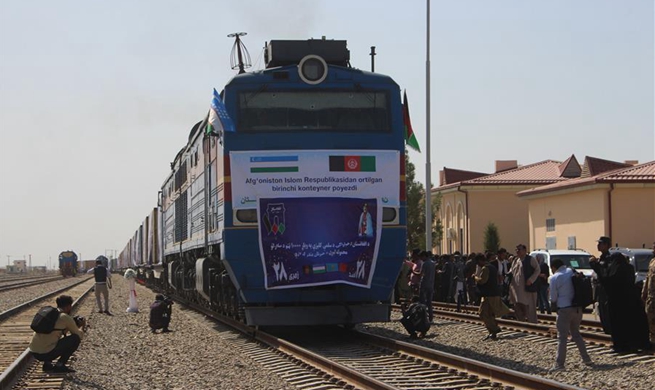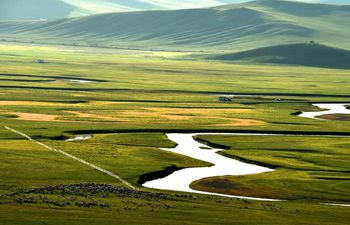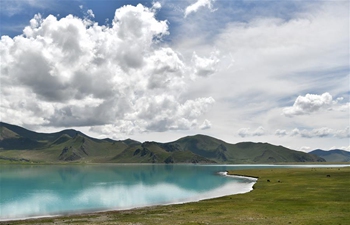ISTANBUL, Sept. 7 (Xinhua) -- Turkey's pursuit of a safe zone in the rebel-held Idlib province of Syria to stem a new wave of refugee influx is not only far from resolving potential problems but would also increase the risk of Syria's division, analysts cautioned.
A safe zone in Idlib may initially look like a good idea, but would pose big security threats to Turkey, Cahit Armagan Dilek, director of the Ankara-based 21st Century Turkey Institute, told Xinhua.
Turkish President Recep Tayyip Erdogan said on Tuesday that Ankara would be much happy if a safe zone could be established in Idlib, underlining that Turkey cannot tolerate a fresh wave of migrants.
The Russia-backed Syrian army captured several towns and dozens of villages from the rebels in a major offensive last month, sending tens of thousands of more Syrians fleeing to the Turkish border.
The Idlib province, the last rebel bastion in war-torn Syria, is estimated to have around 3 million residents.
"Tens of thousands of terrorists may enter Turkey along with more than 1 million refugees already based near the Turkish border," Dilek warned, expecting the Syrian army to attempt to take all provinces into its control in the coming months.
Turkey is officially hosting more than 3.6 million Syrian refugees, but the real figure is widely estimated to be well over 4 million if unregistered Syrians are counted.
"Even if realized, the safe zone idea would also be only a temporary arrangement, a volatile one, if harboring not only civilians but also tens of thousands of hardcore jihadists," Faruk Logoglu, a former senior diplomat, told Xinhua.
"The jihadists would not stay put and are likely to commit acts of terrorism, including against Turkey," he warned, saying the rebels had already accused Ankara of having abandoned them over its failure to stop the recent Syrian army offensive.
Erdogan's remarks came after a meeting with his Russian counterpart Vladimir Putin over Idlib at the end of last month.
Days after their meeting, Syria announced a unilateral cease-fire in Idlib and stopped military operations against the rebels.
"If Russians jointly make the safe zone (with the Turkish military), it would make Russia Turkey's second neighbor after the Americans to the east (in Syria)," Logoglu remarked.
"This is not a good prospect. Syria only should be Turkey's neighbor," he said.
Turkey has also been working, despite problems in bilateral ties, with the U.S. to create a safe zone in northeastern Syria, where U.S. troops have trained and heavily armed the Kurdish militia seen by Ankara as terrorists.
Both analysts think that the creation of safe zone would raise the risk of the emergence of a federal Syria, if not disintegrated.
As things stand, Syria will turn into a federal state as was the case with Iraq, said Dilek, a former staff officer in the Turkish military.
The Kurds in northern Iraq were first granted protection by a U.S.-created safe zone against the central government headed by former President Saddam Hussein and then obtained autonomy following the U.S. invasion of the oil-rich country in 2003.
"A safe zone anywhere in Syria would only mean a delay in the restoration of the Syrian state's sovereignty over its territories, hence prolonging the conflict and jeopardizing the unity of the country," stated Logoglu.
"The way out in Idlib is to seek an agreement with Damascus that would restore its sovereignty over the region, with appropriate arrangements for the civilian population to stay there and for the rebels to disarm," he said.
The presidents of Russia, Turkey and Iran, partners in the so-called Astana process, are scheduled to meet in Ankara on Sept. 16 to discuss Idlib and political settlement in Syria.
Erdogan revealed that a decision regarding Idlib would be taken at the Ankara summit.
The analysts, however, remain divided on whether Moscow and Tehran would accept a safe zone under Turkish control in Idlib.
There seems to be a consensus among the Astana partners that the area between the Aleppo-Latakia highway and the Turkish border will serve as a safe zone under Ankara's control for the moment, said Dilek.
The trilateral summit in Ankara may decide who will control the so-called M4 highway linking Aleppo with Latakia, the Syrian army or the Turkey-backed rebels, Dilek said.
"The idea of a safe zone in Idlib is unlikely to materialize if the failure to establish even a buffer zone in Idlib is a measure," argued Logoglu.
He was referring to Turkey's failure to create, in line with a deal with Russia, a de-escalation zone in Idlib to prevent the rebels from attacking Syrian and Russian army positions and stop the clashes.
"A clear endorsement (for a safe zone) from the trilateral Ankara summit should not be expected, given the opposition of the Syrian government to such arrangements and support of Iran and Russia for Damascus," said Logoglu.





